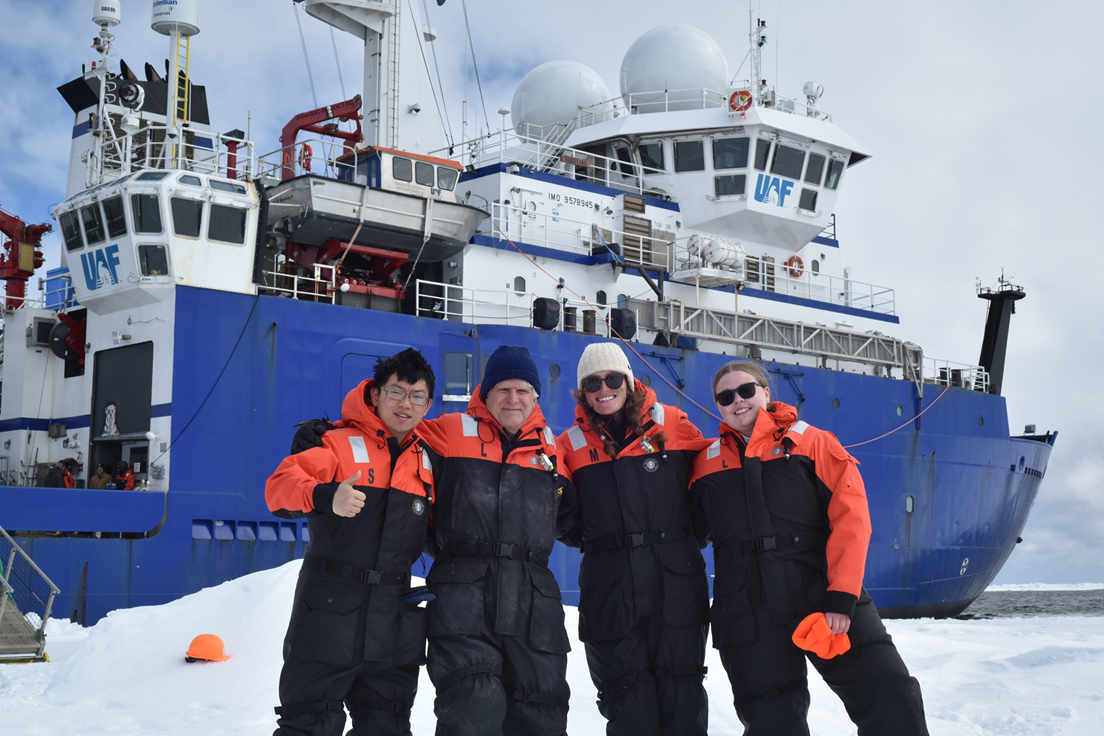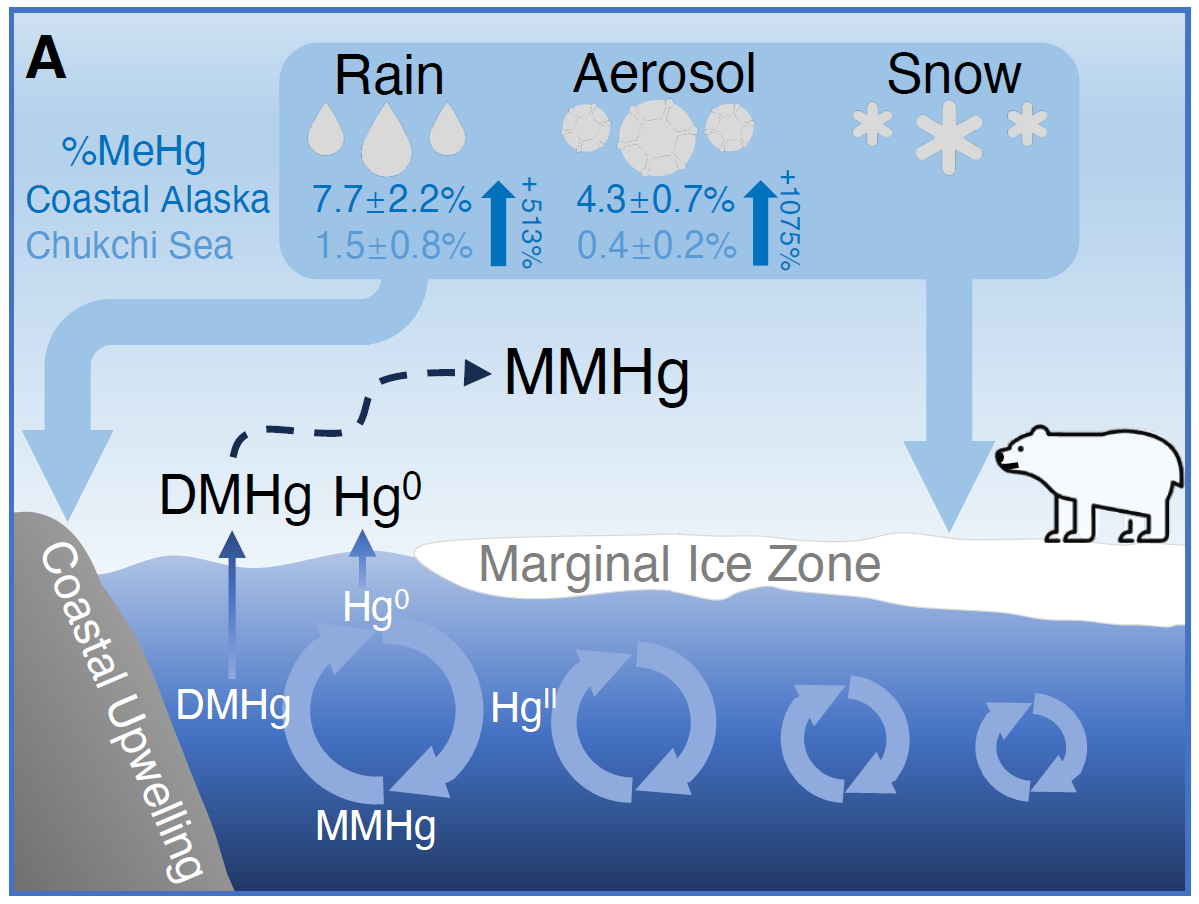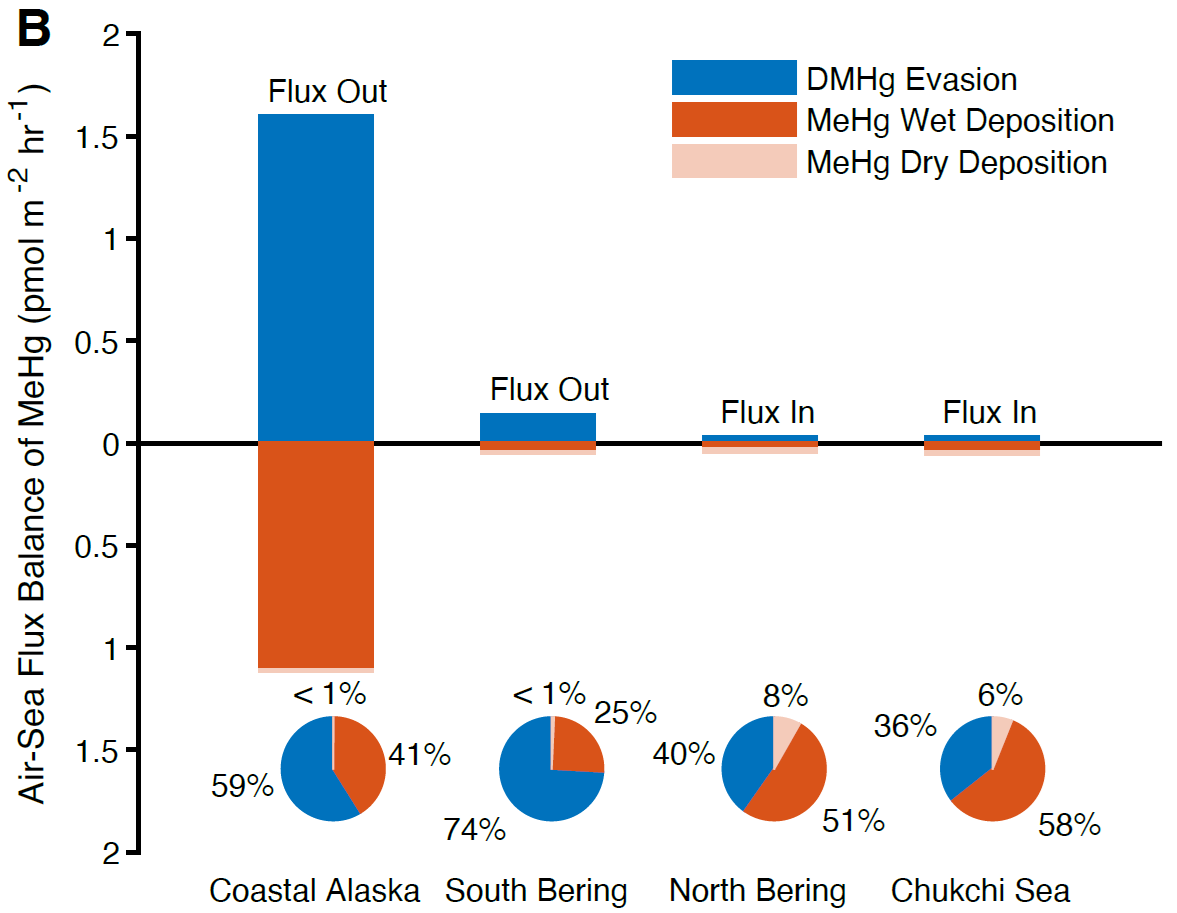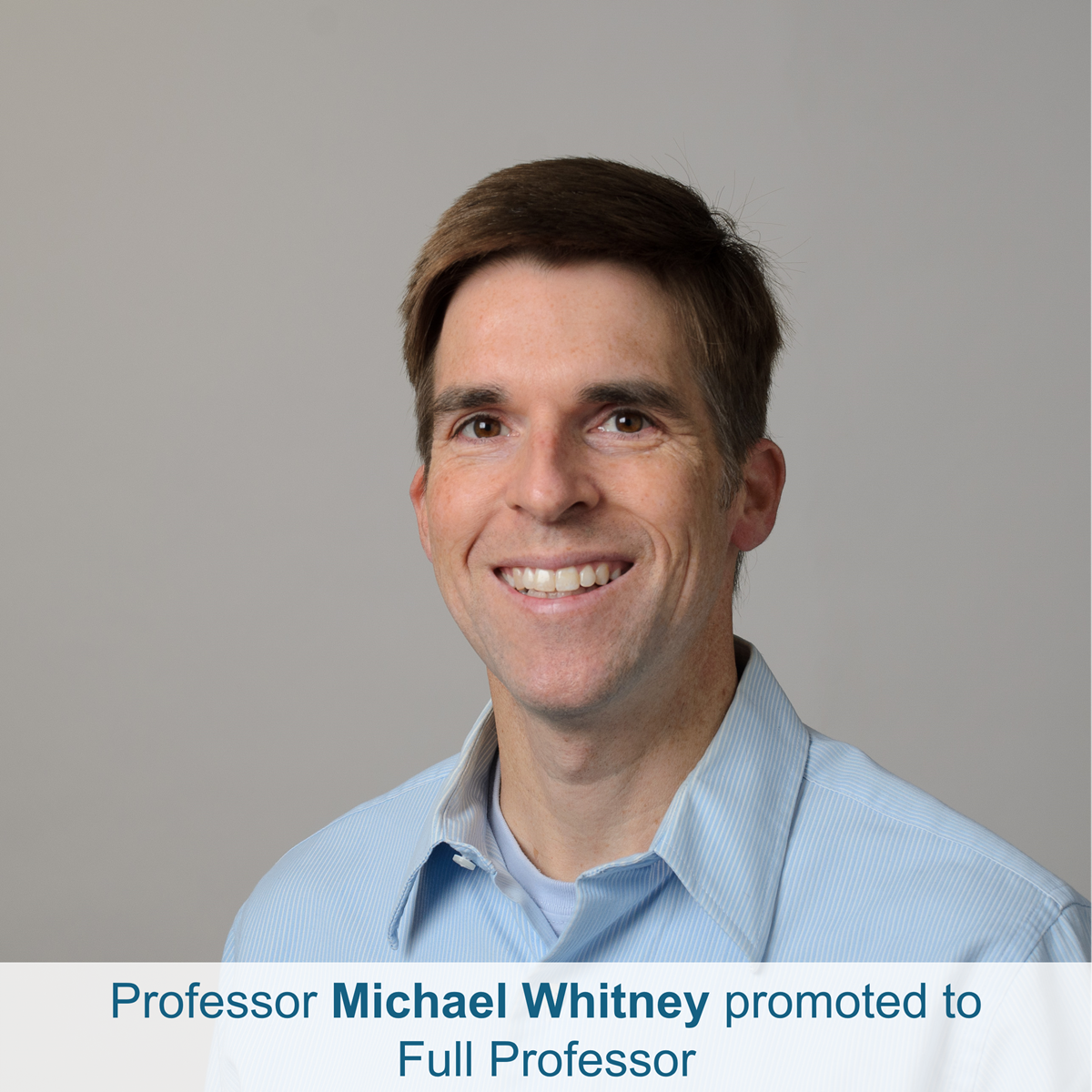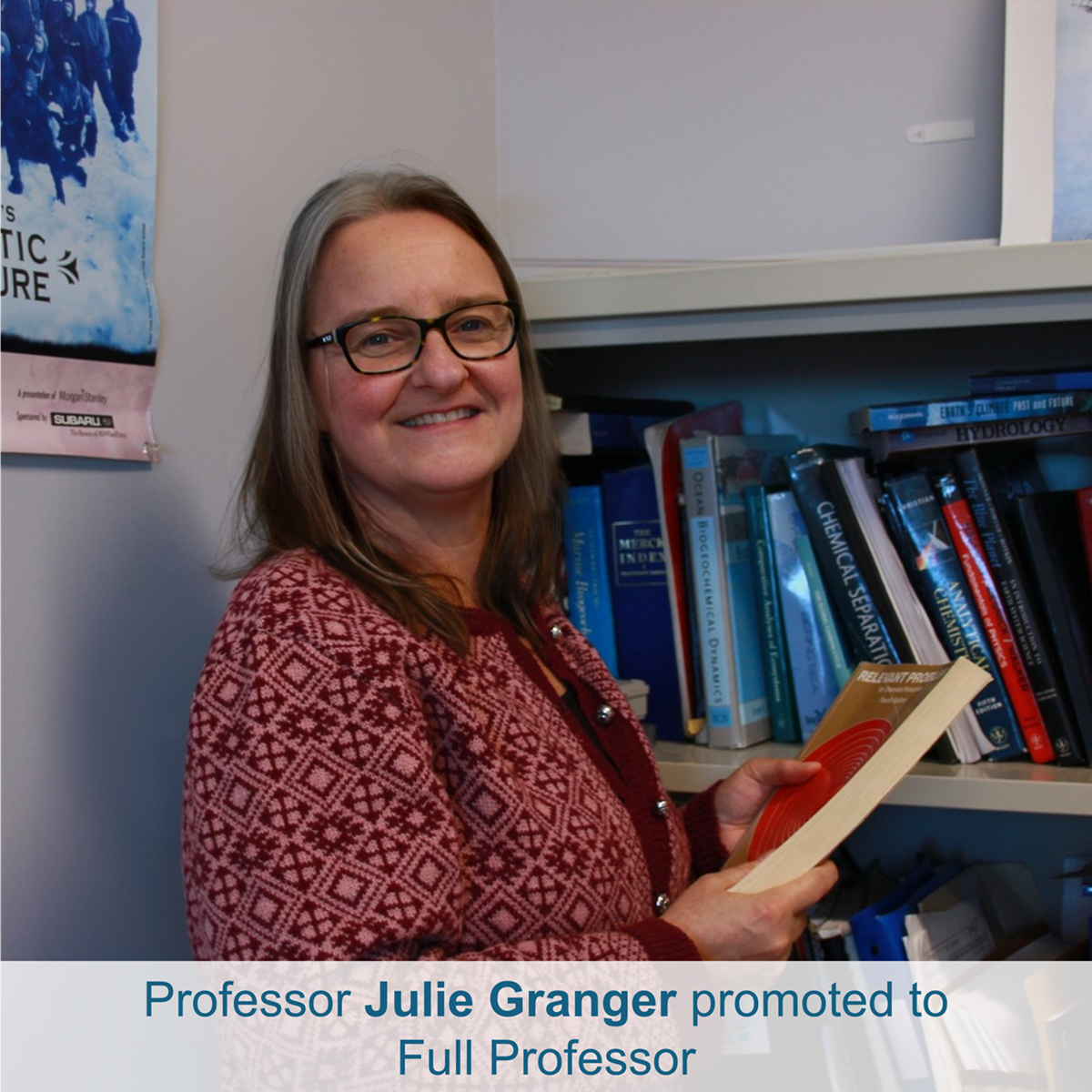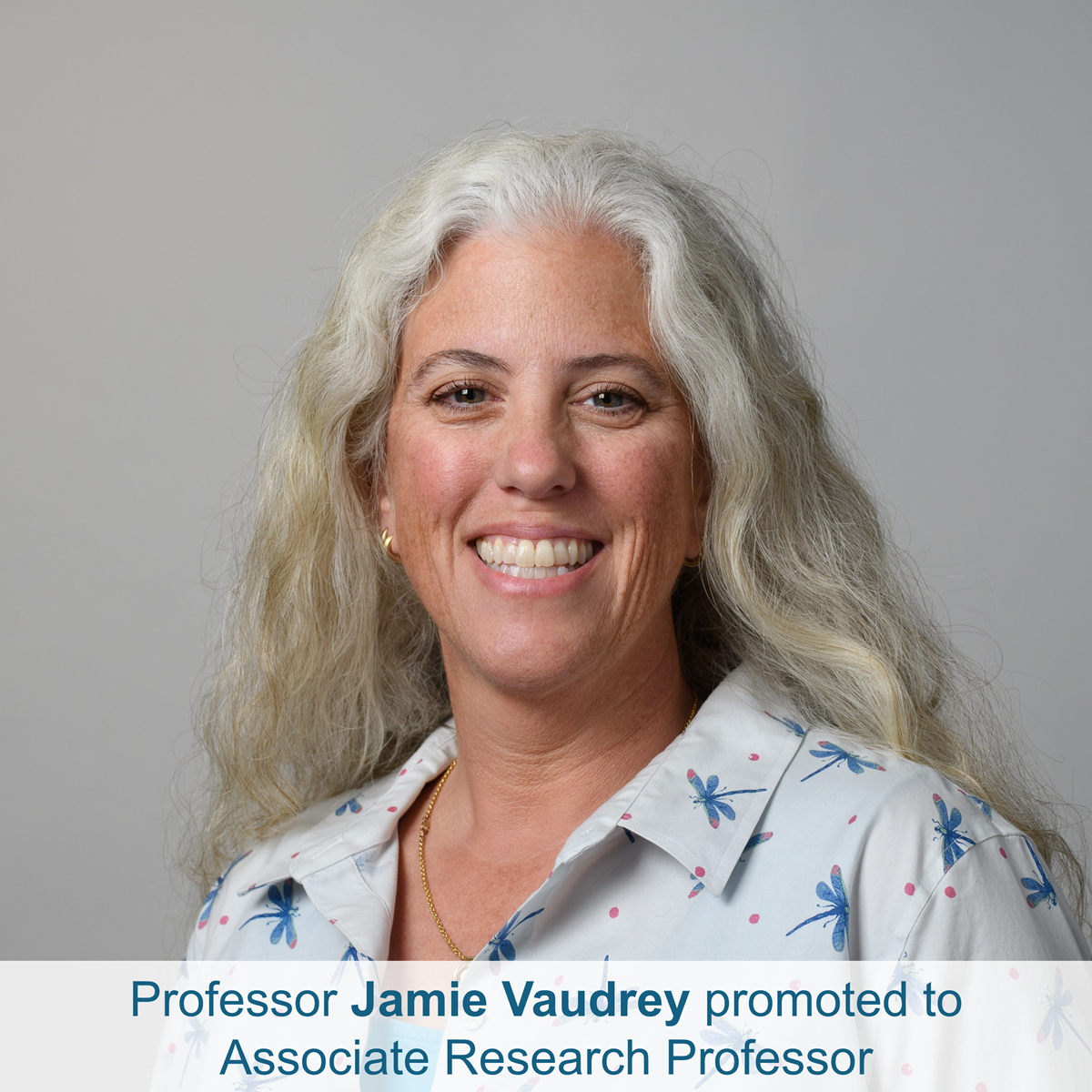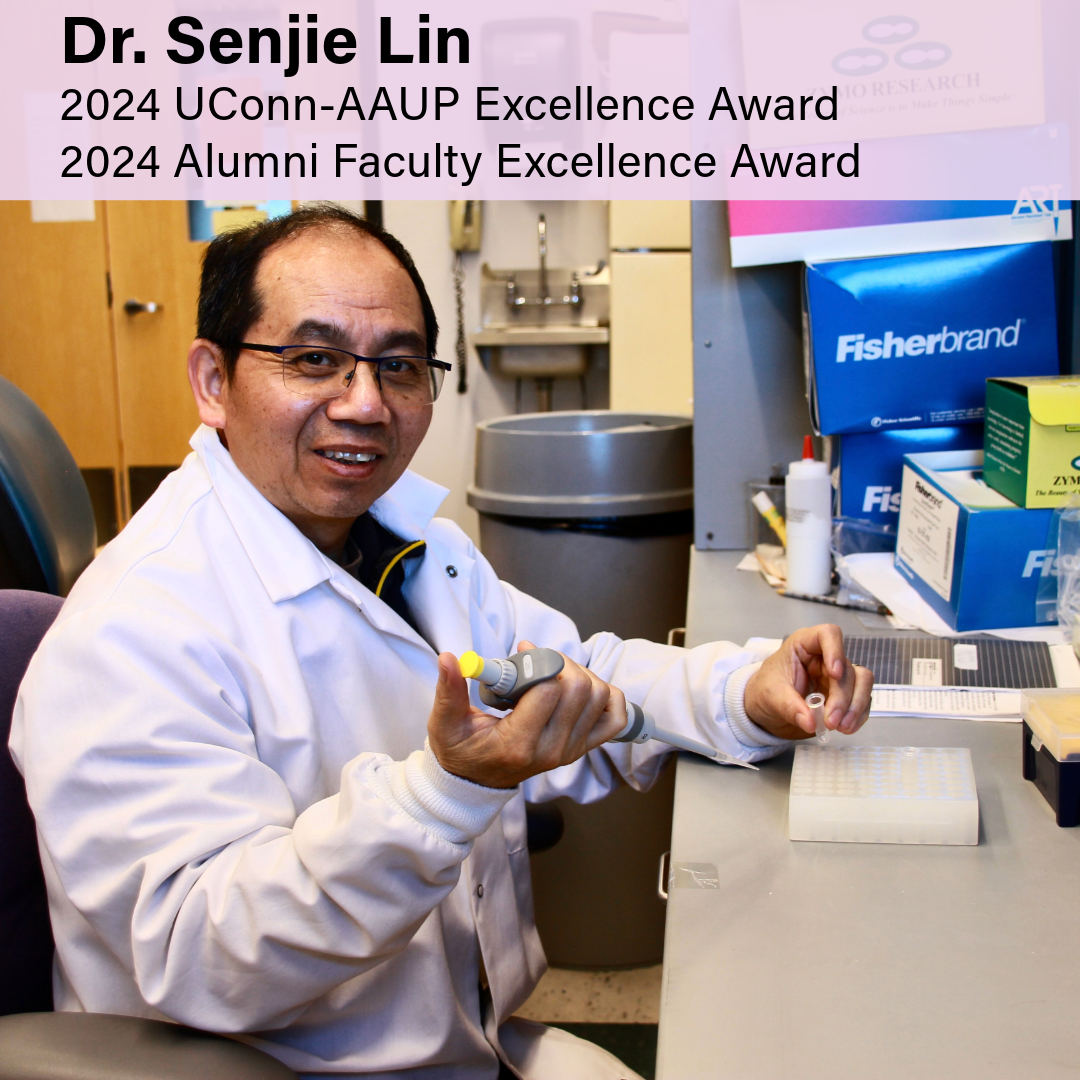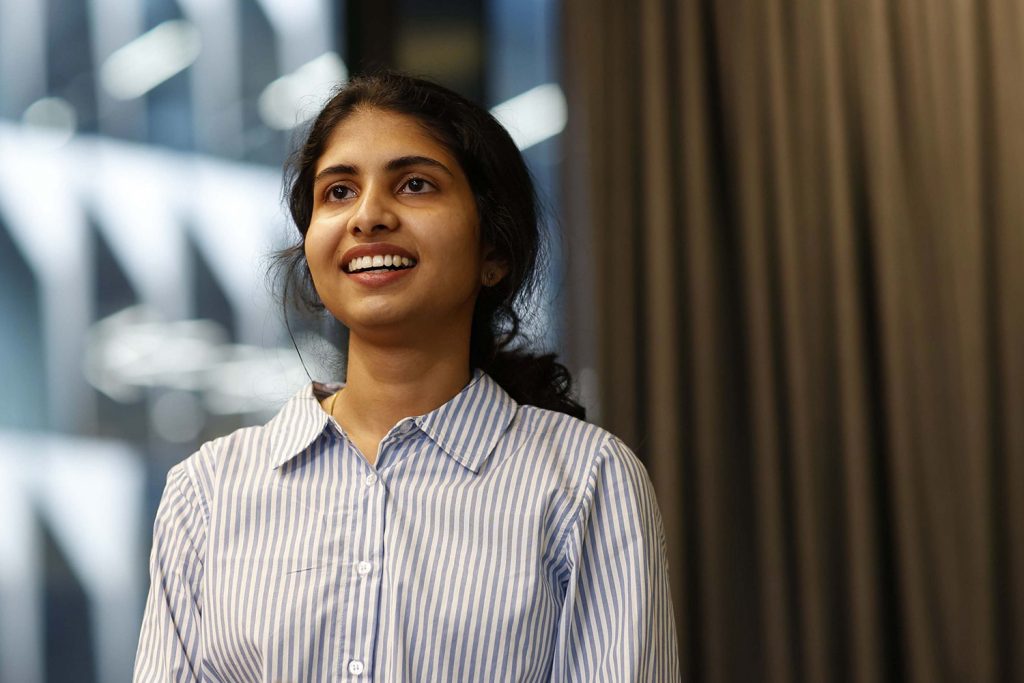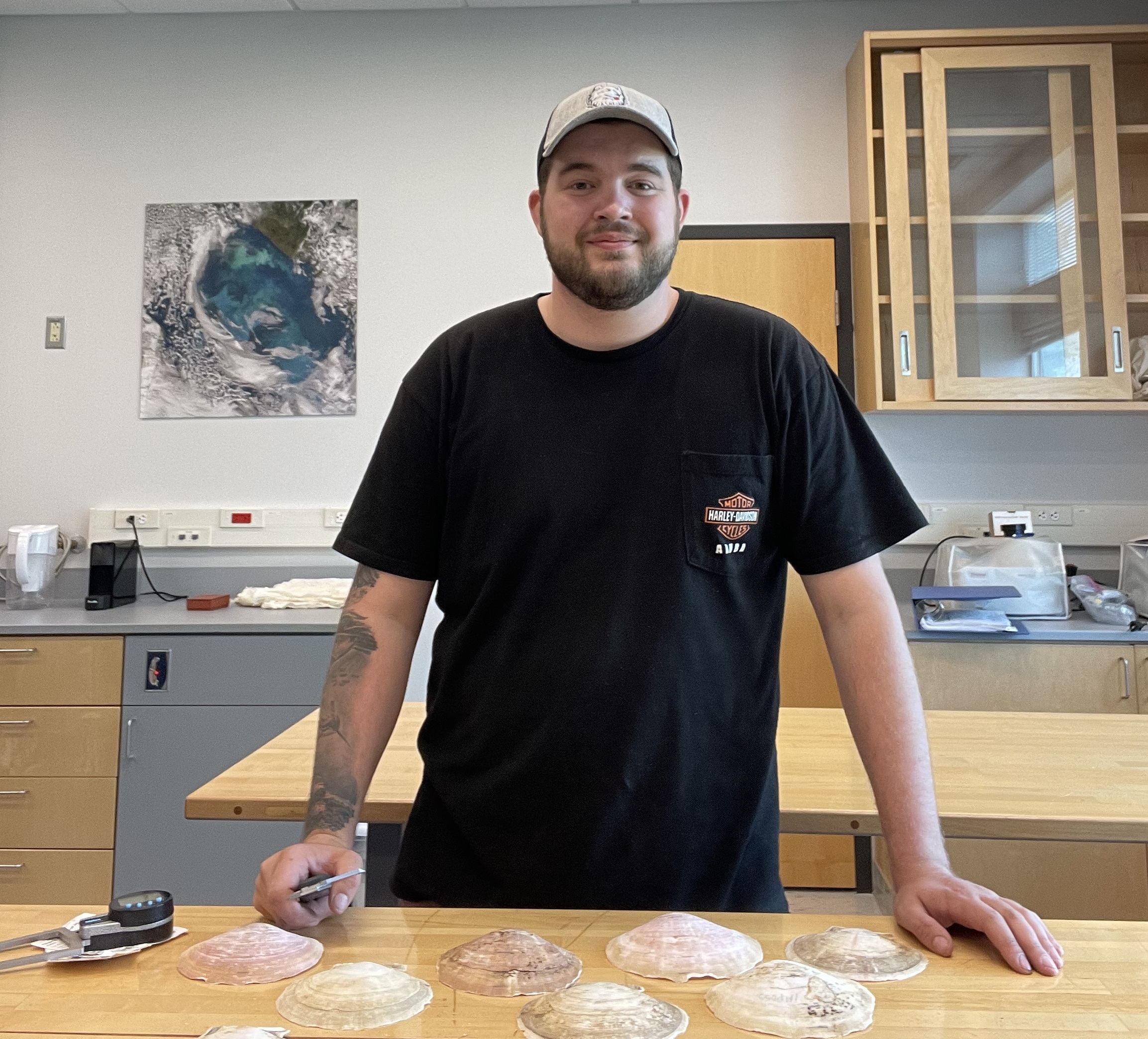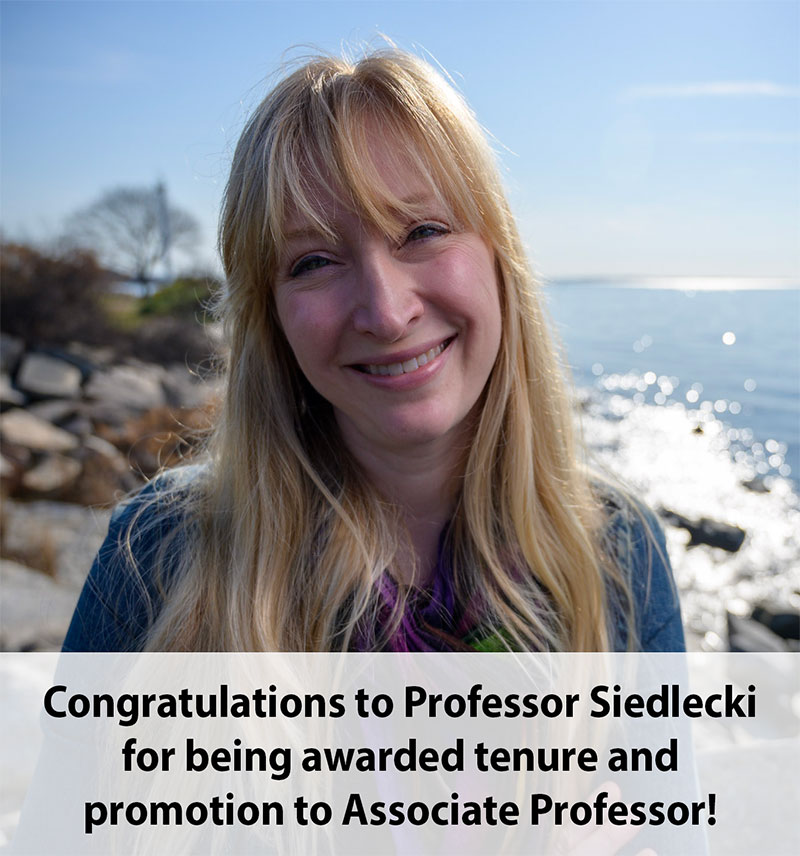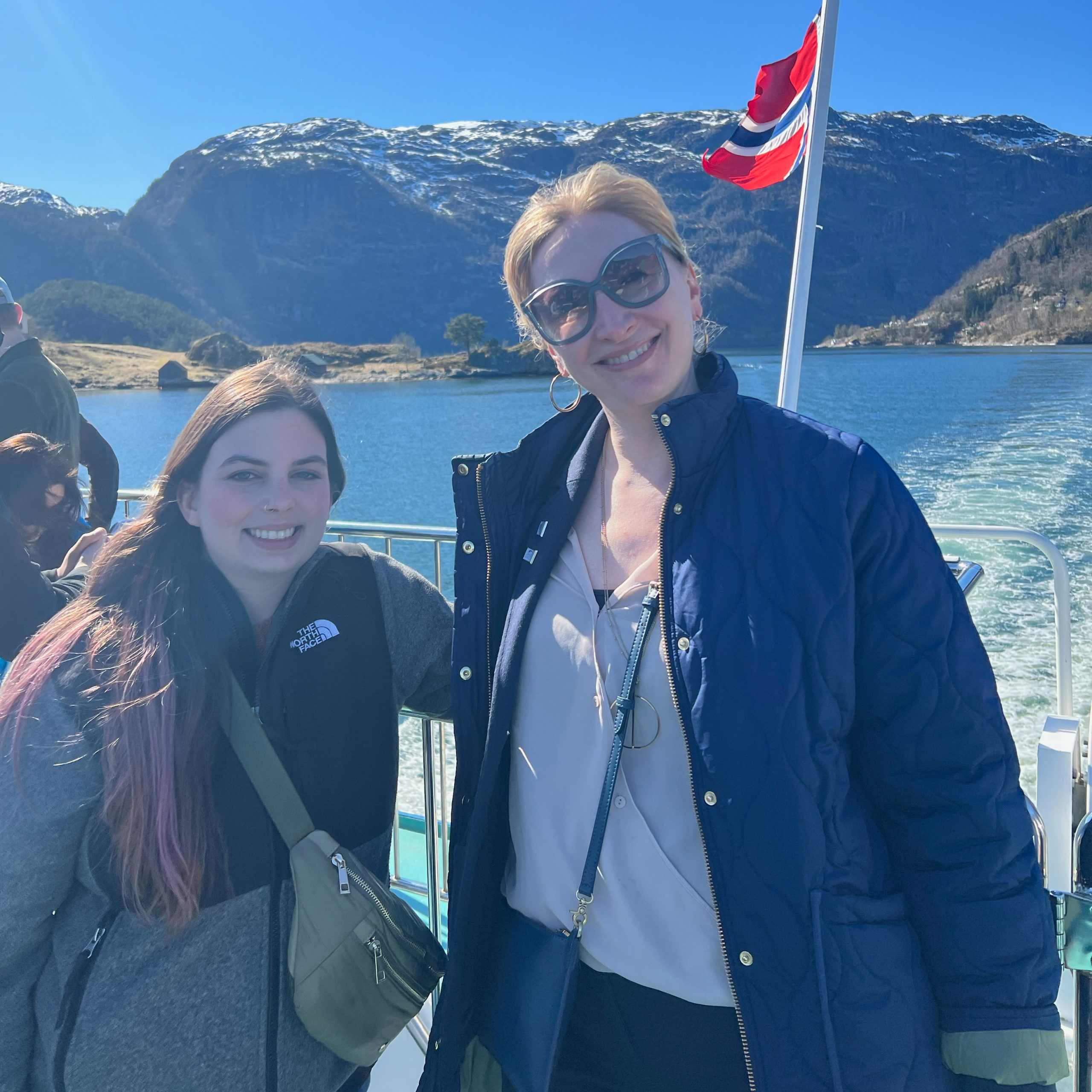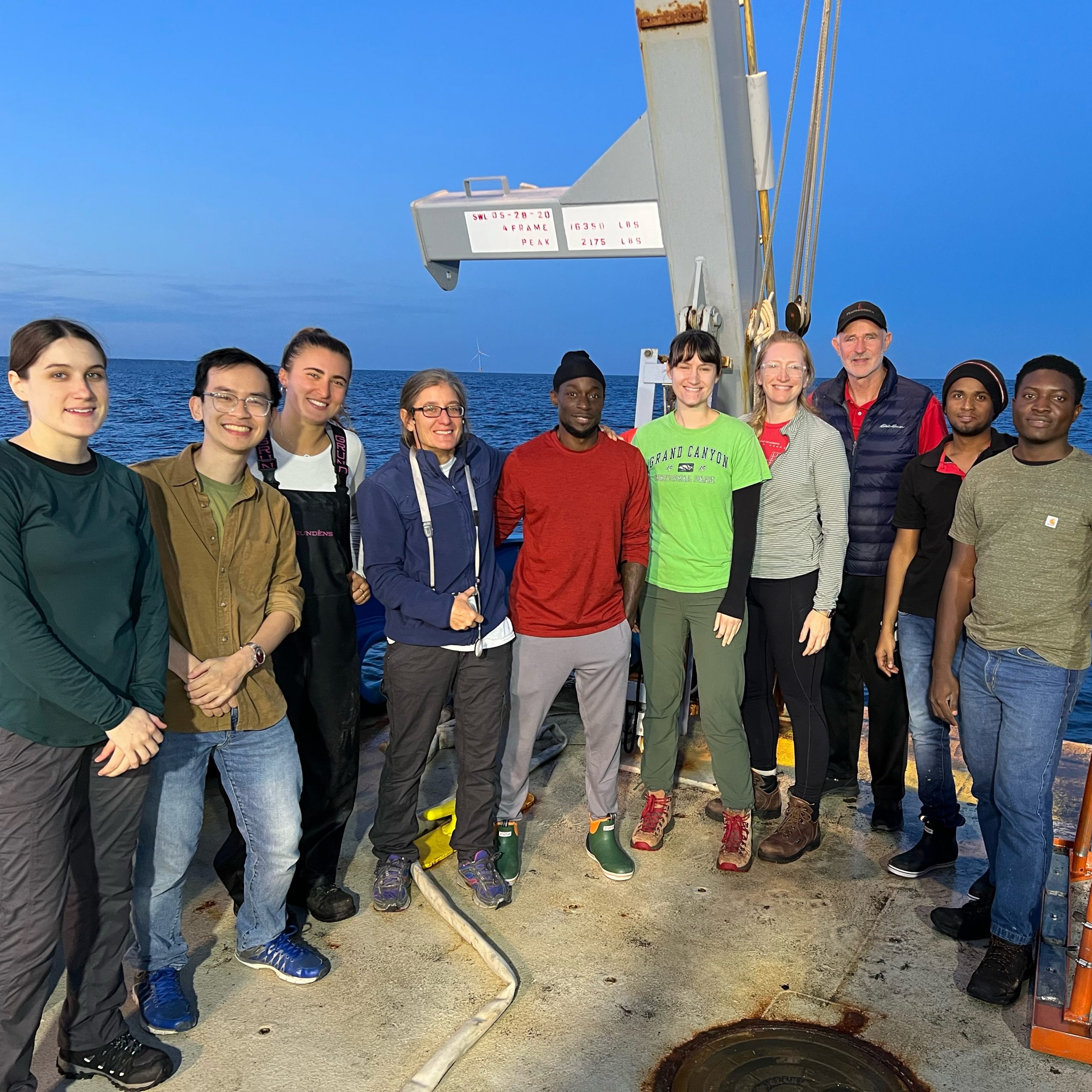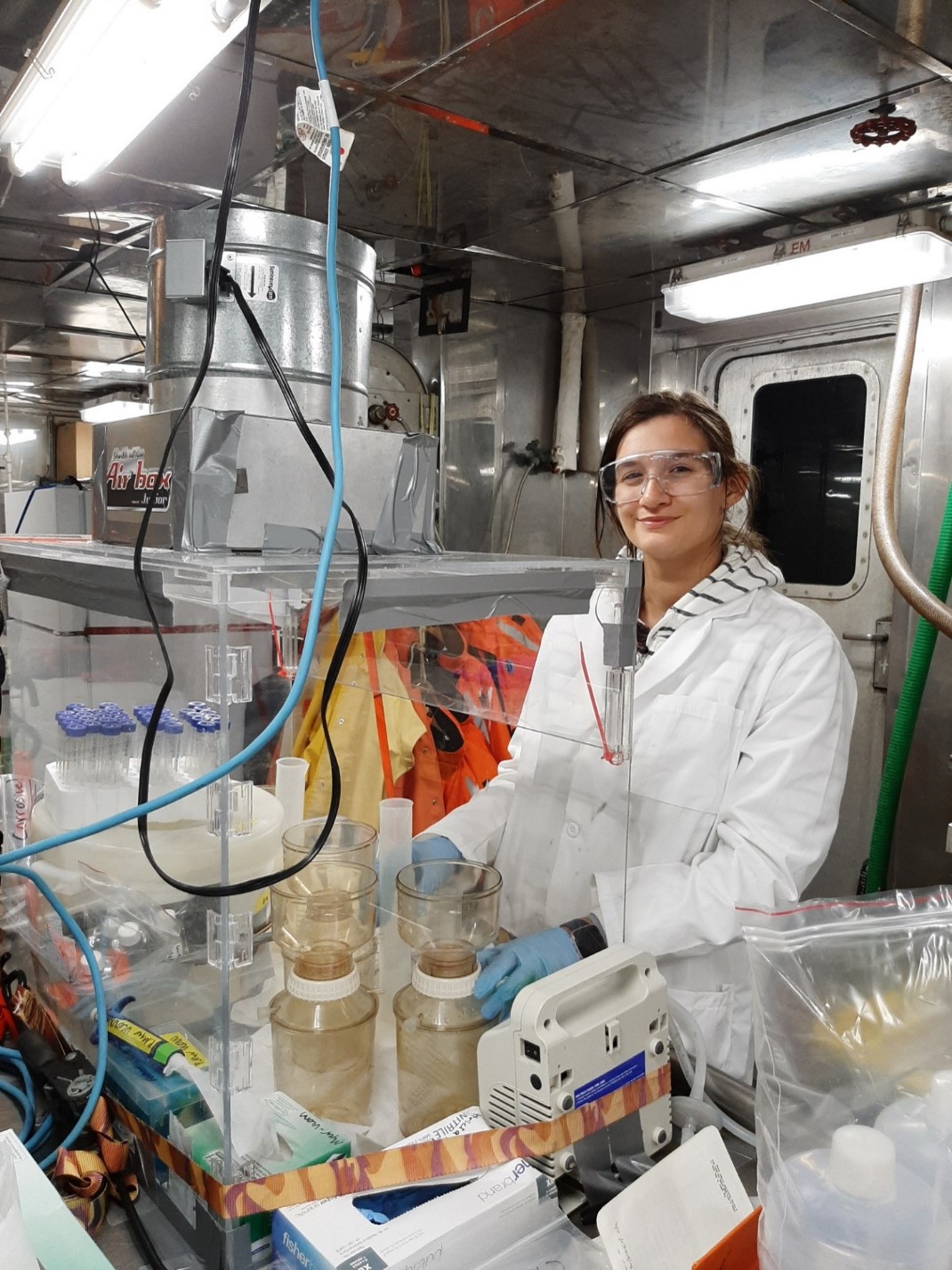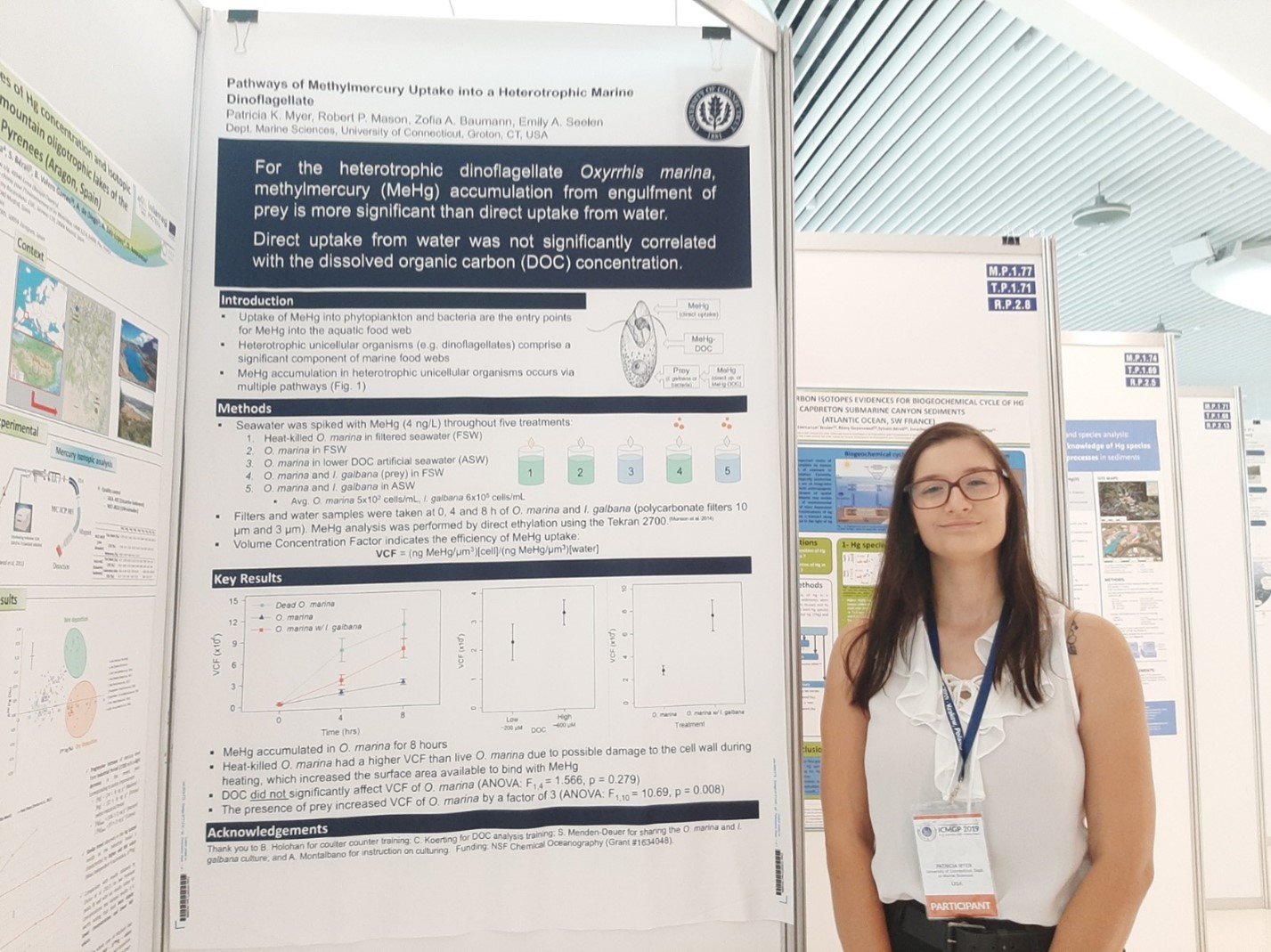Check out a summary of some of the achievements in our department in summer and fall 2023 below!
*identify students
Publications:
Professor Ann Bucklin and Paola Batta Lona
Population genetic analysis reveals distinct demographic histories of two Arctic euphausiid species and their responses to ecological drivers affecting communities in the Arctic Ocean.
Bucklin, A., Questel, J.M., Batta-Lona, P.G. et al. Population genetic diversity and structure of the euphausiids Thysanoessa inermis and T. raschii in the Arctic Ocean: inferences from COI barcodes. Mar. Biodivers. 53, 70 (2023). https://doi.org/10.1007/s12526-023-01371-y
Professor Hans Dam
This study led by alumni James deMayo, shows the limits to adaptation to the ongoing ocean warming and acidification. Animals adapted to these conditions are less fit than animals adapted to current conditions. Hence, there is no free lunch to adaptation to climate change.
deMayo James A.*, Brennan Reid S., Pespeni Melissa H., Finiguerra Michael, Norton Lydia, Park Gihong, Baumann Hannes and Dam Hans G. 2023Simultaneous warming and acidification limit population fitness and reveal phenotype costs for a marine copepod. Proc. R. Soc. B.2902023103320231033. https://doi.org/10.1098/rspb.2023.1033
Professor Heidi Dierssen:
NASA plans to launch three new missions for monitoring aquatic ecosystems from space: PACE in 2024, Geostationary Littoral Imaging Radiometer in 2026, and SBG in 2028. Each mission monitors unique space and time scales from inland water quality to coastal seagrass habitats to upwelling zones supporting rich phytoplankton blooms. Having many more wavebands than historic sensors, these missions will allow us for the first time to monitor phytoplankton diversity from space. Dr. Dierssen serves as the Science and Applications Team Leader for the PACE mission and is on the mission team for the SBG mission.
Dierssen et al. 2023. “Synergies Between NASA’s Hyperspectral Aquatic Missions PACE, GLIMR, and SBG: Opportunities for New Science and Applications”. Journal of Geophysical Research: Biogeosciences,
128, e2023JG007574. https://doi.org/10.1029/2023JG007574
Several spectral indices have been proposed in the last decade for remote detection of macroplastics in the environment, however no comprehensive analysis has been provided on the over land and water. Published and new algorithms proposed in this study were evaluated on hyperspectral remote sensing imagery taken over plastic targets in Ostend, Belgium. Dr. Dierssen developed and worked on this study as a Fulbright scholar to Belgium.
Castagna, Dierssen, et al. 2023. “Evaluation of historic and new detection algorithms for different types of plastics over land and water from hyperspectral data and imagery” Remote Sensing of the Environment. https://doi.org/10.1016/j.rse.2023.113834
Professor Senjie Lin:
In an opinion piece, Lin analyzed the complexity of how phosphorus-nutrient limitation interacts with ocean acidification in impacting phytoplankton, the foundation of the marine ecosystem. He further brought forth a suite of fundamental research questions that need to be addressed and proposed several multi-disciplinary multi-platform approaches that need to be deployed to address these questions.
Lin, S. Phosphate limitation and ocean acidification co-shape phytoplankton physiology and community structure. Nat Commun 14, 2699 (2023). https://doi.org/10.1038/s41467-023-38381-0
https://www.nature.com/articles/s41467-023-38381-0
Professor David Lund:
This paper indicates that weakening of the Atlantic overturning circulation regularly occurs when the Earth transitions from glacial to interglacial conditions (i.e. deglaciations). Graduate student Monica Garity’s results suggest weakening of the Atlantic circulation plays a key role in deglaciation, most likely through accumulation of heat in the subsurface North Atlantic and subsequent melting of ice shelves.
Multi-proxy evidence for Atlantic Meridional Overturning Circulation (AMOC) weakening during deglaciations of the past 150,000 years
Monica Garity and David Lund
Accepted in Paleoceanography and Paleoclimatology
Professors Rob Mason, Penny Vlahos, Michael Whitney, and Zofia Baumann:
The study, conducted while Maodian Liu was a visiting scientist at DMS, identified the importance of the river plume as a hot spot of methylmercury production in Long Island Sound. This finding is significant because methylmercury is toxic and bioaccumulative, and understanding its biogeochemical cycling is essential for public health management. The studies were conducted in conjunction with studies of carbon and nutrient dynamics in LIS (Vlahos and Whitney’s funded research).
“Riverine Discharge Fuels the Production of Methylmercury in a Large Temperate Estuary” Maodian Liu, Robert P. Mason, Penny Vlahos, Michael M. Whitney, Qianru Zhang, Joseph K. Warren, Xuejun Wang, Zofia Baumann. Environmental Science & Technology 2023 Vol. 57 Issue 35 Pages 13056-13066 DOI: 10.1021/acs.est.3c00473
Professors Rob Mason and Zofia Baumann:
This research highlighted the importance of the reduced sulfur content of organic matter in influencing the binding of methylmercury to dissolved organic matter and to influencing its bioaccumulation at the base of the aquatic food chain. The work was led by alumni Emily Seelen.
Seelen, E.A.*, Liem-Nguyen, V., Wünsch, U., Baumann, Z., Mason, R.P., Skyllberg, U., Björn, E. 2023.. Dissolved organic matter thiol concentrations determine methylmercury bioavailability across the terrestrial-marine aquatic continuum. Nat Commun 14, 6728. https://doi.org/10.1038/s41467-023-42463-4
Professor Rob Mason:
During cruises in 2021 in the Arctic, Marissa determined the relationship between nitrification in the water column and mercury methylation as this is an unexplored pathway for the production of methylmercury in ocean waters. Her studies showed that nitrification bacteria could be important for mercury methylation.
Despins, M.C., Mason, R.P., Aguilar-Islas, Lamborg, C.H., Hammerschmidt, C.R., Newell, S.E. 2023. Linked mercury methylation and nitrification across the oxic sub-polar regions. Frontiers in Environ. Chem., 4: DOI: 10.3389/fenvc.2023.1109537.
This chapter in the book highlighted the importance of sources and cycling of inorganic and organic contaminants in impacting human and wildlife health.
Chen, C.Y., Mason, R.P., Lohmann, R., Muir, D. 2023. Chemical pollution and the ocean. In: Oceans and Human Health: Opportunities and Impacts, 2nd Ed.,, Fleming, L.E. et al. (Eds.), Chapter 13, Elsevier, 351-426.
Mason, R.P., Buckman, K.L., Seelen, E.A., Taylor, V.T., Chen, C.Y. 2023. An examination of the factors influencing the bioaccumulation of methylmercury at the base of the estuarine food web. Sci. Tot, Environ. 866: Art. # 163996.
Professor Jim O’Donnell:
Knowing the height and period of waves at the shore of Connecticut during major storms is central to the cost-effective design of coastal flood protection systems. We have made measurements of waves for almost 20 years at two locations in Long Island Sound (WLIS and CLIS) in the deeper parts of the Sound, so we need a model to create estimates at the coast. This paper, led by alumni Amin Illia, describes our implementation of FVCOM and SWAVE to do that, and it reports how well it works and what we need to do to improve it.
Ilia, Amin*, Alejandro Cifuentes-Lorenzen, Grant McCardell, and James O’Donnell. 2023. “Wind Wave Growth and Dissipation in a Narrow, Fetch-Limited Estuary: Long Island Sound” Journal of Marine Science and Engineering 11, no. 8: 1579. https://doi.org/10.3390/jmse11081579
https://www.mdpi.com/2077-1312/11/8/1579
Professor Samantha Siedlecki:
Over the past 10 years, Siedlecki and her team have developed a seasonal ocean prediction system, JISAO’s Seasonal Coastal Ocean Prediction of the Ecosystem (J-SCOPE), for the coastal waters of the Pacific Northwest. The results of this work include publicly available seasonal forecasts of ocean acidification variables, hypoxia, temperature, and ecological indicators that are tailored for decision-makers involved in federal, international, state, and tribal fisheries that have been used to inform decisions. This work provides a retrospective look at the first 10 years of forecasting.
Siedlecki, S.A., S.R. Alin, E.L. Norton, N.A. Bond, A.J. Hermann, R.A. Feely, and J.A. Newton. Can seasonal forecasts of ocean conditions aid fishery managers?: Experiences from 10 years of J SCOPE. Oceanography. 2023. https://tos.org/oceanography/assets/docs/36-2-3-siedlecki.pdf
Professor Pieter Visscher:
The Bernhard paper investigated the role of biology in Earth’s oldest fossils (2.3 to 3.5 billion year old), using modern analogs. The Bernhard et al. paper discovered new species of protists that shape the internal fabric microbial rocks. This work the was co-authored by one DMS undergraduate (Luke Fisher), two DMS MS students (Quinne Murphy, Heidi Yeh) and two other DMS faculty (Paola Batta Lona and Ann Bucklin)
Bernhard, J.M., L.A. Fisher, Q. Murphy*, L. Sen, H. Yeh*, A.S. Louyakis, F. Gomaa, M. Reilly, P.G. Batta Lona, A. Bucklin, V. Le Roux, P.T. Visscher 2023. Transition from stromatolite to thrombolite fabric: Potential role for reticulopodial protists in lake microbialites of a Proterozoic ecosystem analog. Frontiers in Microbiology 30, doi: 10.3389/fmicb.2023.1210781
The paper first authored by Marlisa Marthino de Brito is about understanding whiting events (production of small carbonate minerals) in lakes. Often, these CO2-consuming mass events are predicted based on the chemical composition of the water column (the alkalinity) but are not observed because the picoplankton “slime” scavenges the calcium from the water and inhibits the mineral production. This slime is later degraded by microbes at the sediment surface and minerals are formed there . This has implications for satellite estimations of carbon sequestration in lakes. Marlisa defended her PhD on September 27, at the Université de Bourgogne Franche-Comté in Dijon, France. Pf. Visscher was her major advisor.
Martinho de Brito, M., I. Bundeleva, F. Marin, E. Vennin, A. Wilmotte, L. Plasseraud, P.T. Visscher. 2023. Properties of exopolymeric substances (EPSs) produced during cyanobacterial growth: Potential role in whiting events. Biogeosciences 20:3165–3183, doi.org/10.5194/bg-20-3165-2023.
Professor Penny Vlahos:
For the first time, the contribution of sedimentary fluxes to carbon and nutrient cycling in the shallow Pacific Arctic region was empirically quantified; carbon and nutrient effluxes from sediments were shown to be greatest in ice-free waters with high rates of surface productivity.
Barrett, L. J.*, Vlahos, P., Hammond, D. E., & Mason, R. P. (2023). Sediment-water fluxes of inorganic carbon and nutrients in the Pacific Arctic during the sea ice melt season. Continental Shelf Research, 105116. https://doi.org/10.1016/j.csr.2023.105116
Professor Evan Ward:
Blue mussels were exposed to nylon microfibers, a particle control, or non-particle control for 21 days, but these exposures did not show any effects on the mussel gut microbiome or gut tissues. Please find here: https://ami-journals.onlinelibrary.wiley.com/doi/full/10.1111/1462-2920.16496
Collins, H.I.*, Griffin, T.W.*, Holohan, B.A., & Ward, J.E. (2023) Nylon microfibers develop a distinct plastisphere but have no apparent effects on the gut microbiome or gut tissue status in the blue mussel, Mytilus edulis. Environmental Microbiology, 1-15. Available from: https://doi.org/10.1111/1462-2920.16496.
Voiding feces (depuration) is an important factor that determines the community structure of gut microbiomes from blue mussels.
Griffin, T.W.*, Darsan, M.A., Collins, H.I.*, Holohan, B.A., Pierce, M.L., & Ward, J.E. (2023). A multi-study analysis of gut microbiome data from the blue mussel (Mytilus edulis) emphasises the impact of depuration on biological interpretation. Environmental Microbiology, 1-15. https://doi.org/10.1111/1462-2920.16537
Professor Ward and Sandra Shumway
A critical assessment of microplastics in molluscan shellfish with recommendations for experimental protocols, animal husbandry, publication, and future research
Sandra E. Shumway, Kayla Mladinich*, Noreen Blaschik, Bridget Holohan and J. Evan Ward. Reviews in Fisheries Science and Aquaculture 2023. https://doi.org/10.1080/23308249.2023.2216301 Open Access until March 1, 2024 https://www.tandfonline.com/doi/full/10.1080/23308249.2023.2216301
Grants:
Professor Heidi Dierssen:
Dr. Dierssen was awarded a new NASA Interdisciplinary Science grant $1.7M to study phytoplankton, carbon, and sea ice dynamics in the Western Antarctic Peninsula region of the Southern Ocean with colleagues from Rutgers University, University of Colorado, and Woods Hole Oceanographic Institution.
Professor Rob Mason:
NSF Chemical Oceanography. 9/1/2023-8/31/2026. Mason, sole PI. Constraining the air-sea exchange of inorganic and methylated mercury with high resolution spatial and temporal measurements in the Sargasso Sea. $680,675.
Professor Leonel Romero
The Air-Sea Interaction Laboratory received a $712,215 grant from NSF to conduct novel measurements of breaking waves in the open ocean using stereo imagery from visible and infrared cameras. The results of this study will contribute greatly to our understanding of wave breaking with important implications for air-sea exchanges, remote sensing, and the prediction of microseisms.
Professor Samantha Siedlecki:
A new award to study coastal terrestrial liming as a potential method of mCDR via ocean alkalinity enhancement with a holistic program to monitor the carbon chemistry of a small coastal lagoon before and after the application of calcitic limestone on the surface of an abutting golf course. This work is a part of a larger investment that the NOAA Ocean Acidification Program on behalf of the National Oceanographic Partnership Program (NOPP) announces $24.3M of funding to advance research in marine carbon dioxide removal. https://oceanacidification.noaa.gov/fy23-nopp-mcdr-awards/
NOPP (2023-2026) mCDR 2023: An opportunity to study Ocean Alkalinity Enhancement, CDR, and ecosystem impacts through coastal liming (PI: Palter, URI) Total $1,538,451.52 ($300,540 to UConn)
Awards:
Congratulations to graduate student Mengyang Zhou was awarded the CERF (Coastal and Estuarine Research Foundation) Rising TIDES (Toward an Inclusive, Diverse, and Enriched Society) Scholar 2023. This award provides valuable support for attending conferences and fostering career development in the field of coastal and estuarine science and management.
Congratulations to Mengyang Zhou on receiving the best poster award at the recent Gordon Research Conference on Coastal Ocean Dynamics in June of 2023. His poster entitled “Constraints on the bottom water residence time in an economically-important embayment of the Southern Benguela Upwelling System” is work that is part of an NSF-funded project led by Pf. Julie Granger and Pf. Samantha Siedlecki in partnership with colleagues at the University of Capetown. Mengyang ran a series of particle tracking experiments in a high-resolution simulation to quantify the residence time of bottom waters plagued with hypoxia. Interannually, years with short bottom water residence time experienced little hypoxia. This work is part of his Ph.D. dissertation research with Pf. Julie Granger.
Our PhD student Anagha Payyambally was featured in UConn Today to celebrate her achievement of receiving the Quad Fellowship. Anagha is one of only 100 recipients out of over 3000 applicants to receive this fellowship to her graduate studies. This new fellowship program supports exceptional students who are citizens of the United States, Australia, India, and Japan to support their graduate studies in the United States and build collaboration among scientists and technologists. Read the story here with quotes from Anagha and her advisor Dr. Manning.
Congratulations to Brendon Goulette, an undergraduate student in our department who was awarded a Connecticut Sea Grant Undergraduate Research Fellowship for the work he is doing with Professors Catherine Matassa and Samantha Siedlecki and PhD student Halle Berger. Brendon is researching how climate change is affecting sea scallops, a significant commercial fishery in New England.
Read more about Brendon’s research here!
